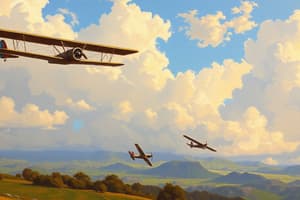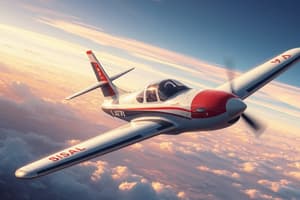Podcast
Questions and Answers
What is the correct inflation pressure for the main landing gear tires in option b?
What is the correct inflation pressure for the main landing gear tires in option b?
- 33 Psi
- 30 Psi
- 32.5 Psi
- 35 Psi (correct)
In the event of an engine failure during the takeoff run, what is the first action regarding the throttle lever?
In the event of an engine failure during the takeoff run, what is the first action regarding the throttle lever?
- Leave throttle unchanged
- Turn throttle off completely
- Increase throttle to maximum
- Set throttle to BOTH IDLE (correct)
What should be done regarding the autopilot during an engine failure in flight?
What should be done regarding the autopilot during an engine failure in flight?
- Turn it off (correct)
- Leave it unchanged
- Adjust its settings appropriately
- Turn it on to assist with control
What is the altitude condition to maintain an airspeed of over 62 KIAS during a climb following an engine failure?
What is the altitude condition to maintain an airspeed of over 62 KIAS during a climb following an engine failure?
Which emergency procedure item should be performed last in the event of an engine fire on the ground?
Which emergency procedure item should be performed last in the event of an engine fire on the ground?
What should the pilot do with the fuel selectors during an engine fire on the ground?
What should the pilot do with the fuel selectors during an engine fire on the ground?
What is a crucial memory item during engine failure during a climb?
What is a crucial memory item during engine failure during a climb?
In the emergency procedure for engine securing, what is the first action regarding the throttle lever?
In the emergency procedure for engine securing, what is the first action regarding the throttle lever?
What is the minimum crew required for maximum occupants of 4 people?
What is the minimum crew required for maximum occupants of 4 people?
What is the maximum allowable load for the baggage compartment?
What is the maximum allowable load for the baggage compartment?
What does a red warning indicating RH LOW COOLANT signify?
What does a red warning indicating RH LOW COOLANT signify?
What is the rotation speed with flaps set to T/O for a maximum takeoff weight of 1180 kg?
What is the rotation speed with flaps set to T/O for a maximum takeoff weight of 1180 kg?
What is the best angle of climb speed (Vx) for flaps set to 0 at MTOW of 1180 kg?
What is the best angle of climb speed (Vx) for flaps set to 0 at MTOW of 1180 kg?
What does an amber caution indicating LH GENERATOR signify?
What does an amber caution indicating LH GENERATOR signify?
What color indicates emergency conditions on the annunciator panel?
What color indicates emergency conditions on the annunciator panel?
What is the aft limit CG limit for all weights?
What is the aft limit CG limit for all weights?
What is the normal oil pressure above 1400 rpm prop for the aircraft?
What is the normal oil pressure above 1400 rpm prop for the aircraft?
What does the red warning LH OVERVOLT signify in the aircraft?
What does the red warning LH OVERVOLT signify in the aircraft?
What is the maximum takeoff weight of the P2006T?
What is the maximum takeoff weight of the P2006T?
What is the maximum fuel pressure allowed for this aircraft?
What is the maximum fuel pressure allowed for this aircraft?
Which of the following represents an approved maneuver for the aircraft?
Which of the following represents an approved maneuver for the aircraft?
What is the minimum fuel pressure that should be maintained?
What is the minimum fuel pressure that should be maintained?
What is the maximum landing weight of the P2006T?
What is the maximum landing weight of the P2006T?
What is the maneuvers load factor limit with flaps retracted?
What is the maneuvers load factor limit with flaps retracted?
Flashcards are hidden until you start studying
Study Notes
Tire Pressures
- Nose tire pressures:
- 1.7 Bar / 24 Psi
- 2.0 Bar / 28 Psi
- 1.5 Bar / 23 Psi
- 1.8 Bar / 25 Psi
- Main landing gear tire pressures:
- 2.3 Bar / 33 Psi
- 2.5 Bar / 35 Psi
- 2.0 Bar / 32 Psi
- 2.2 Bar / 32.5 Psi
Engine Failure Procedures During Takeoff
- Before rotation, continuous takeoff after engine failure:
- Minimum crew of 1 pilot and maximum occupants of 4 (including pilot) or 3 (excluding pilot).
- Abort takeoff actions:
- Throttle lever: BOTH IDLE
- Utilize rudder for heading control
- Apply brakes as required
Engine Securing in Flight
- Engine shutdown procedure:
- Throttle lever set to IDLE
- Ignition: BOTH OFF
- Propeller lever: FEATHER
- Fuel selector: OFF
- Electric fuel pump: OFF
Engine Failure During Climb and In-Flight
- Actions when engine fails during climb or in-flight:
- Autopilot: OFF
- Maintain heading using rudder and ailerons
- Adjust attitude to maintain airspeed above 62 KIAS
Engine Fire on the Ground
- Immediate actions during engine fire:
- Fuel selectors: BOTH OFF
- Ignitions: ALL OFF
- Electric fuel pumps: BOTH OFF
- Cabin heat and defrost: OFF
- MASTER SWITCH: OFF
- Engage parking brake
- Evacuate aircraft immediately
Baggage and Load Limits
- Maximum allowable load in baggage compartment:
- 80 kg / 176 lb
- Maximum takeoff weight of P2006T:
- 1180 kg or 2601 lb
- Maximum landing weight of P2006T:
- 1180 kg or 2601 lb
- Maximum zero wing fuel weight of P2006T:
- 1180 kg or 2601 lb
Center of Gravity (CG) Limits
- Forward CG limit:
- 0.415 m (31% MAC) aft of datum
- Aft CG limit:
- 0.221 m (16.5% MAC) aft of datum
Generator and Warning Indicators
- Amber caution LH GENERATOR indicates:
- Left hand generator failure
- Green advisory LG Down and Locked indicates:
- Landing gear extended and locked
- Red warning RH LOW COOLANT indicates:
- Right engine coolant liquid low level
Annunciator Panel Colors
- Green illuminates for operational devices turned ON
- Amber signifies no-hazard situations requiring crew action
- Red indicates emergency conditions
Flight Performance Speeds
- Rotation speed with flaps set to T/O (MTOW = 1180kg):
- 64 KIAS
- Best-angle-of-climb speed (Vx) with flaps 0 (MTOW = 1180kg):
- 64 KIAS
Oil Pressure Specifications
- Normal oil pressure above 1400 rpm prop:
- 2 - 5 Bar / 29 – 73 psi
- Maximum oil pressure above 1400 rpm prop:
- 7 Bar / 102 psi
Startup and Fuel Pressure
- Engine starting allowable temperature range:
- OAT Min -25 °C, OAT Max +50 °C
- Minimum fuel pressure:
- 0.15 Bar / 2.2 Psi
- Maximum fuel pressure:
- 0.50 Bar / 6.0 Psi
Aircraft Maneuvering Limits
- Maneuvers load factor limits with flaps retracted:
- +3.8 g and – 1.78 g or +4.0 g and – 2.00 g
- Maneuvers load factor limits with flaps extended:
- +3.8 g and – 1.78 g
Approved Maneuvers
- Approved maneuvers exclude:
- Stalls (except whip stalls), lazy eights, chandelles, spins, and turns with bank angle over 60 degrees
Studying That Suits You
Use AI to generate personalized quizzes and flashcards to suit your learning preferences.




